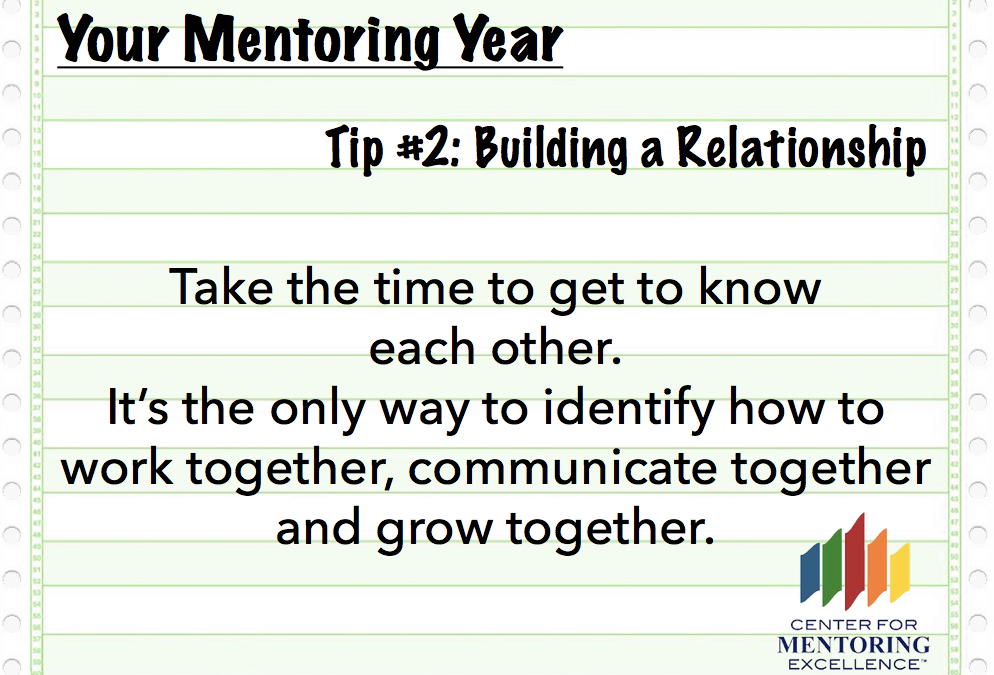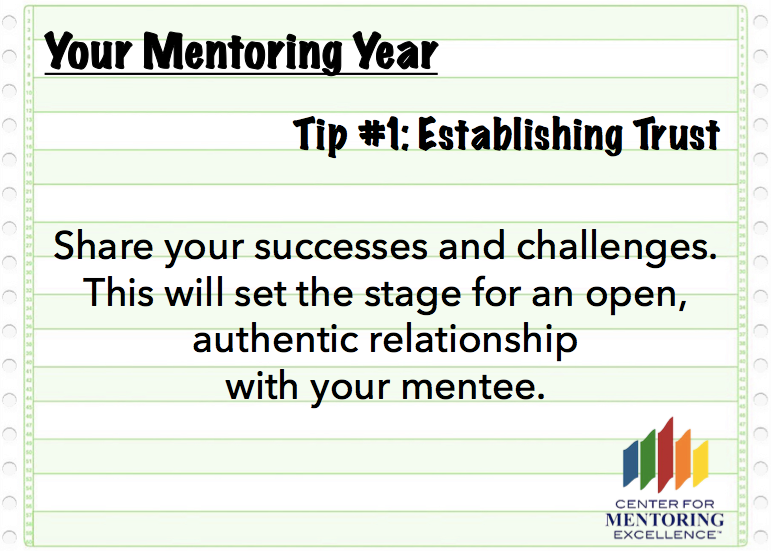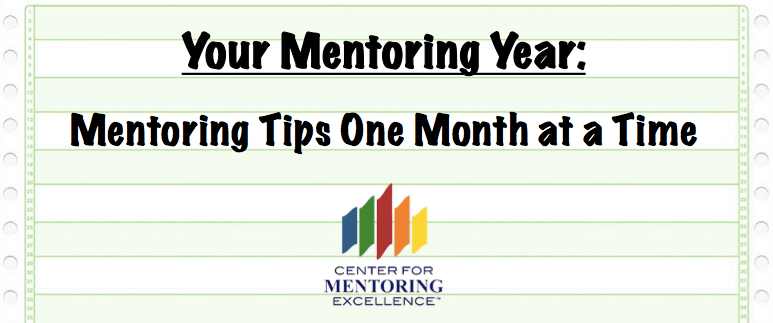
by Center for Mentoring Excellence | May 8, 2017 | Facilitating Learning, Growth and Development, Making Mentoring Work For You, Mentoring Communication, Mentoring Questions, Mentoring Relationships, Supporting Mentors and Mentees
Taking the time to work on a mentoring relationship is not always easy. But these relationships are truly the heart of any successful mentoring endeavor. In fact, it’s often a prerequisite for success. Mentors and mentees who discuss their relationship expectations end up experiencing exponentially more success than those who don’t.
One mentee, an associate at a large law firm, lamented that the relationship wasn’t working because her mentor focused only on the path to partnership. The mentee told us, “That’s not appealing to me. It’s like preparing for a pie-eating contest where the prize is more pie.” That mentoring pair was ultimately unsuccessful because they didn’t take the time to learn how each other tick.
Here are some questions to ask your mentoring partner that will set a strong foundation for the relationship:
- What motivates you in your career?
- How do you learn best? Do you need time to process alone, or do you process best by “thinking aloud”?
- What are your pet peeves?
- Do you like to read? Are you open to article and/or book suggestions? Would that be welcome or feel burdensome?
- Have you had a mentor/mentee in the past? What worked in that relationship? What did not work?
Missed Tip #1? Find it here. And make sure to come back next month for Tip #3!

by Center for Mentoring Excellence | Apr 24, 2017 | Facilitating Learning, Goal Setting Conversation, Growth and Development, Mentoring Communication
Does this mentoring conversation sound familiar?
“When my mentee complains about her VP, I take a small breath. The normal me would start coaching, telling, suggesting, and problem solving. That’s what I am good at. But guess what? That’s not what she is looking for from me, nor does she really need it.
My mentee knows what she needs to do. What she is actually looking for is acknowledgement and support for approach and strategies. So, I’ve learned to don my facilitator hat and start the conversation by asking questions. And I listen. And I learn. I learn what she is thinking. I learn what frustrates her. I learn what she has already tried. I learn what has worked. And mostly I learn what a talented, perceptive, ambitious woman she is. I look for ways to applaud her efforts and her thinking. I hold up a mirror for her and sometimes help her tweak her idea. We both come away having learned something new, along with increased appreciation of our different points of view.”
Conversation should come easy to all of us, right? Wait. Not so fast. What often passes for conversation is sometimes something quite different: information sharing, transactions, question and answer, and even push-back.
Really good mentoring conversation is more about exploring and sharing, rather than telling and reporting. It’s about going deeper, not staying broad and skimming the surface. Good mentoring conversation connects us to one another.
Conversation matters because there is a lot at stake. At the Center for Mentoring Excellence we set high standards for mentoring conversations. We believe really good mentoring depends on a continuum of meaningful conversation. Mentoring partners engage in conversation to grow their relationship, identify learning goals, and work on mentee growth and development. So, you see, there is a lot riding on what you do.
Takeaway: Be brave enough to start a conversation that matters — because it does!

by Center for Mentoring Excellence | Apr 5, 2017 | Facilitating Learning, Growth and Development, Making Mentoring Work For You, Mentoring Communication, Mentoring Questions, Mentoring Relationships, Supporting Mentors and Mentees
Trust is everything when starting out in a new mentoring relationship — and even when you’re nurturing an existing one! While it’s tempting to dive in and drill down quickly to talk about needs and goals at the first meeting, try to avoid this. Instead, focus first on establishing an open and authentic relationship. It takes time and attention, but in the long run, it’s well worth it. You will have established a deeper, more meaningful, trusting relationship. Here are some things to keep in mind:
- Get to know your mentee, and let your mentee get to know you. To jump start the process, come prepared with a list of questions. What is it you want to know about your mentee as a person? What do you want to know about your mentee’s work context?
- Your mentee needs to relate to you, too. Mentees are more forthcoming when a mentor shares their personal success stories, as well as their struggles. If you’re open and authentic, it invites your mentee to be, too.
Check back soon for “Your Mentoring Year” Tip #2!

by Center for Mentoring Excellence | Apr 3, 2017 | Goal Setting Conversation, Growth and Development, Making Mentoring Work For You, Mentoring Relationships, Supporting Mentors and Mentees
How is your year going so far?
With summer right around the corner, we thought it was the perfect time to inject some energy and excitement into your mentoring relationships.
So how about some helpful tips and tools? Just like any other healthy habit, building and sustaining thriving mentoring relationships is a non-stop process, requiring constant care, learning and adjusting.
With this in mind, we’re starting a new program for you — Your Mentoring Year: Mentoring Tips One Month at a Time. Each month we will focus on a mentoring practice, approach or technique that contributes to your mentoring excellence. As part of each month’s tip we’ll discuss why it’s important and how you can specifically apply these practices immediately to enhance your mentoring relationships. It’s both informative and actionable!
After a full year, you can refer back to these monthly tips to assess your effectiveness.
Sound good? Keep an eye out for our first month’s tip early this week!

by Center for Mentoring Excellence | Aug 11, 2016 | Facilitating Learning, Goal Setting Conversation, Growth and Development, Making Mentoring Work For You, Mentoring Questions, Mentoring Relationships
One of the biggest parts of mentoring? Asking questions! But when should you ask questions? And when the time is right, what should you ask? Here’s a handy list of questions you should be asking your mentee over the course of your mentoring relationship:
For starting the mentoring relationship:
- How do we make this process work for you?
- What are your expectations?
- What would you recommend we do to make this work?
- What are you willing to commit to?
For goal setting:
- What is the most important thing you want to achieve?
- What can I do to help you with your leadership development?
- What is your strongest attribute?
- Where do you see your challenges?
- What would help raise your confidence level?
For pushing and challenging your mentee:
- Is this goal worthy of our time and effort together?
- What might be a challenging project for you to undertake?
- What would it be like to step out of your comfort zone?
- How is this goal going to contribute to your development?
- Did you think you are putting in sufficient effort to accomplish results?
- Why do you think there is only one solution? What else might you try?
- If you were grading your results, what grade would you give yourself?
For goal achievement:
- Did you get the results you hoped for?
- How would you approach this situation?
- Where else can you apply that?
- What is your team looking for from you?
- Is your supervisor seeing a difference?
- How else might you tackle that?
For checking in and feedback:
- What value has this provided for you thus far?
- What can we do differently to improve this relationship?
- Are we on the right path?
- What feedback have you received?
- How do you know you are making an impact?
- How can we make this work for both of us?
- How do you think you are doing?
- Are you satisfied with your results?
- Are you putting in the effort you feel you should?
- You’re quiet … what are you thinking?
- Whose feedback would be a benefit to you?
Ready to get started? Let us know how these questions help improve your mentoring relationships.
(Photo via Flickr CC: Colin_K)







